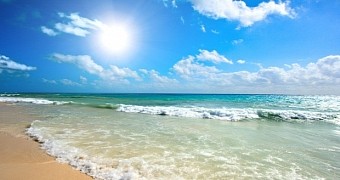You know those tranquil beaches that look like the absolute best place to bask in the sun with your tush resting on the warm sand? Well, you might want to stay away from them this summer and all other summers from now on.
According to a team of researchers working with the American Chemical Society, there is more to these beaches than meets the eye. Long story short, myriads of poop bacteria lie hidden in the sand, just waiting to cuddle with you.
How poop bacteria come to populate beaches
Whenever sewage reaches coastal waters, contamination occurs. As explained by scientists, what happens is that fecal bacteria creep into the water, essentially making it a health hazard.
To avoid having people come into contact with these bacteria, “no swimming” signs are placed next to coastal waters that are especially dirty and, therefore, a threat to public health.
The thing is that, as it turns out, such bacteria originating from sewage can also contaminate beaches. In fact, EurekAlert tells us that, in recent year, more poop bacteria have been found in beach sand than in the water.
“Over the past decade, scientists have been finding fecal bacteria in beach sand at levels 10 to 100 times higher than in nearby seawater.” Even so, people keep going to the beach to sunbathe or simply relax.
To make matters worse, medical experts warn that, of the microorganisms found in coastal waters and on beaches, some can cause rashes, stomach aches and diarrhea.
For some reason, poop bacteria love beaches
Writing in the journal Environmental Science & Technology, specialists with the American Chemical Society explain that, according to their investigations, poop bacteria survive longer buried in beach sand than out in open waters.
This might explain why it is that beaches along coastlines appear to be dirtier than the waters of the ocean or the sea lying right next to them.
“Microbial communities tended to decay much slower in the simulated beach sand environment than in the water,” they say. Why this is the case is yet to be determined.

 14 DAY TRIAL //
14 DAY TRIAL //